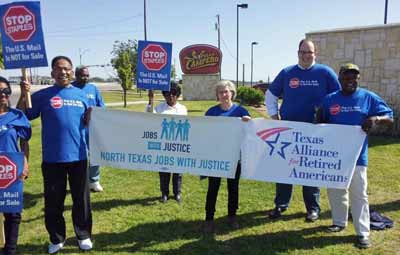Unity Sounds Easy, But It Isn't
 Two terrific coalitions formed in Dallas this Summer. One specifically opposed the privatization of the public schools and the other opposed the American Legislative Exchange Council (ALEC) at the July 30 convention. Both of them include labor and both of them are more successful than any coalitions in recent Dallas history. Both of them represent milestones in the road to unity that Jobs with Justice has worked on for over 20 years. It is a mistake, however, to think that unity among progressive coalitions comes easily.
Two terrific coalitions formed in Dallas this Summer. One specifically opposed the privatization of the public schools and the other opposed the American Legislative Exchange Council (ALEC) at the July 30 convention. Both of them include labor and both of them are more successful than any coalitions in recent Dallas history. Both of them represent milestones in the road to unity that Jobs with Justice has worked on for over 20 years. It is a mistake, however, to think that unity among progressive coalitions comes easily.
Almost all progressive organizations say they want to cooperate with the others. And, idelogically at least, they probably do.
However, to a large extent, progressive organizations are competitors. One can test this truth by asking them if they will share their funding sources. Hardly any would say yes!
Beyond the competition for funding, progressive groups also vie with one another for other scarce resources. They poach each others' volunteers. They compete in currying favor with political leaders or other power sources. They don't share critical information.
Progressive organizations are also driven apart by individual leaders' egos. Petty personality differences constantly threaten unity.
No matter what progressive cause constituted the original purpose of an organization, its main motivation quickly becomes self-perpetuation or self-preservation. Once staff is hired, they have to raise enough money to make sure their salaries keep coming in. Can they be blamed if self-preservation, not unity with other groups, is their first priority?
For some groups, merging their interests generates fears of losing the organization's very existence -- and their own staff salaries. And, to be sure, some of that fear is justified. A longer-term view would say that combined organizations will create more progressive power and more ability to pay salaries --even though the salaries might not come from the original organizations. But we don't always look at the long view, and we particularly won't risk our own jobs, even in the short run.
With these divisive pressures in mind, we confront the problem of bringing progressive groups together. How do we build the unity we all generally want and totally must have? The process can be simple enough. The top, most powerful organizations, usually unions or the AFL-CIO union federation, call meetings of selected progressive groups. To the extent that they already agree, the new coalition partners can work together on actions, campaigns, or projects that enjoy broad agreement. Unity is forged in action. Success births more success. I'm proud to say that the Dallas area, centered on the labor movement, is well along in that process.
The process of growing together is a gradual one. Obstacles can be eroded away. Unity can be achieved. Unity of progressive groups has to be achieved!
--Gene Lantz 8/7/14